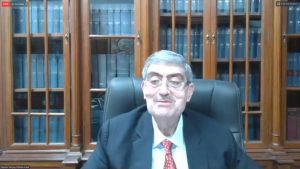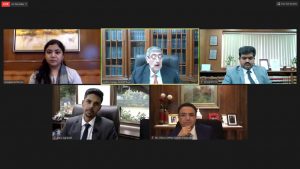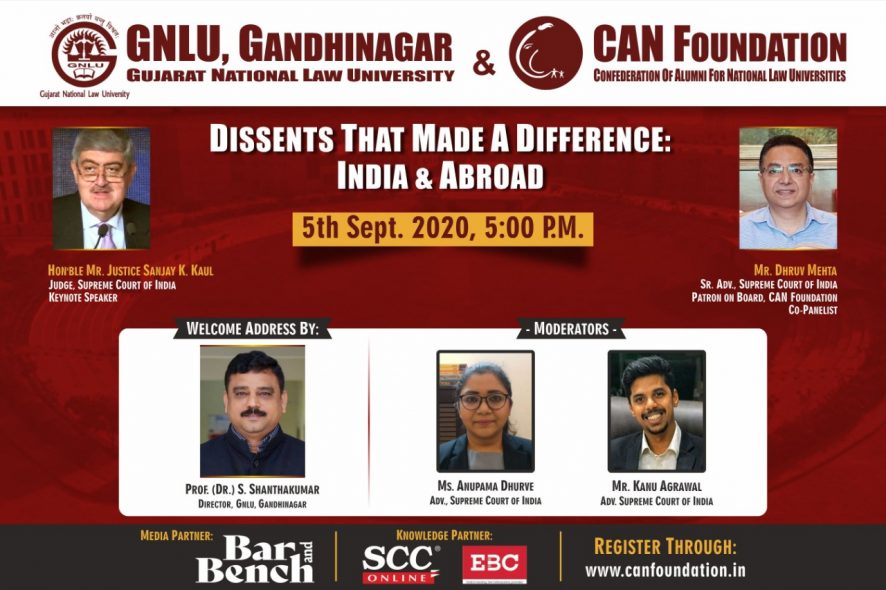Gujarat National Law University, Gandhinagar & CAN Foundation recently hosted an Online Lecture on ‘Dissents That Made A Difference: India & Abroad’.
The panel included Mr. Justice Sanjay Kishan Kaul, Judge, Supreme Court of India and Mr. Dhruv Mehta, Senior Advocate, Supreme Court of India.

The welcome address was given by Prof. (Dr.) S Shanthakumar, Director, Gujarat National Law University. The moderators for the session included young members at the Bar, Ms. Anupama Dhurve and Mr. Kanu Agrawal. Both Ms. Dhurve and Mr. Agrawal are graduates of the National Law Institute University, Bhopal (’10 and ’14 respectively) and are currently practising before the Supreme Court of India, the High Court of Delhi, and various other tribunals.

Justice Kaul began his Keynote Address by underlining the importance of diversity and its manifestation in the constitutional ethos of democratic societies. He agreed with Former US Supreme Court Chief Justice, Justice Charles Evan Hughes’s characterisation of dissent as “an appeal to the brooding spirit of law”.
In an attempt to understand the importance of Dissent in the Constitutional and Civil Rights Discourse, Justice Kaul began with an example of Lord Atkin’s fiery position regarding “reasonable cause” in Liversidge v Anderson, 1941. Further parallel was thus drawn in the Indian context taking stock of the ignominious judgement and a now-validated (in light of Puttaswamy) befitting dissent by Justice HR Khanna in ADM Jabalpur v. Shivkant Shukla, 1976. Viewing free speech in the context of state security and public order, Justice Kaul referenced the American Supreme Court’s decision in Abraham v US, a case challenging conviction of five men prosecuted under Espionage Act, 1917 in a post WW I America. Similar question arose before the Indian Supreme Court in Romesh Thapar v State of Madras where the Court had to demarcate the contours of public order and public safety.
The discussion then veered to the right to privacy. In Kharak Singh v State of UP, the Supreme Court examined the UP Police Regulations and the multitude of fundamental rights violation that it caused. The majority held that Privacy was not a fundamental right. Justice Kaul emphasised J. Subbarao’s dissent and recalled, “nothing is more delirious to man’s happiness than a calculated interference to his privacy” Justice Kaul further educated the attendees about the Puttaswamy case’s and its precipitating effect on reading down of sec 377 in Navtej Singh Johar’s case.
Justice Kaul also discussed the deliberation over women’s reproductive health in America ad said that the dissenting opinion and the majority together creates a immense understanding of the protection of woman’s reproductive health by providing competing and valid conceptions as to the well-established and valuable constitutional rights regarding abortion.
Justice Chelameswar’s dissent in what is popularly known as the NJAC Case was also a point of discussion – the important question being Judicial transparency. Justice Kaul quoted the post-judgment views of Justice Khehar who had penned down the leading opinions in the case. “Help us improve and better the system, the mind is a wonderful instrument. The various opinions when different minds and interests meet or collide is wonderful.
Justice Kaul said that this statement is reflective of the immense importance of diversity of opinions and thoughts as have been discussed, interestingly in the Sabarimala case the dissent came from a lady judge as to what was considered as a woman’s right case.
Justice Kaul’s powerful closing remarks in his address reflected a rather important fact for the contemporary political climate. He said, “courts cannot be unelected governments. They provide check and balance.”
His Lordship concluded by leaving the attendees to ruminate over respecting difference of opinion. He said, “It is necessary to say that the problem is not of dissent. Every society must have opinions and point of view. The debasement however is in the manner of dissent. These differences of views should be set forth in a manner which conveys it as a different. We have lost respect for each other’s opinion. It isn’t right or wrong, it is a question of time. Courts are faced with a situation where political matters under the guise of PILs lead to shrill discourse. We have a democratic government under the Constitution, there is separation of powers, hence Courts can’t be unelected governments. Checks and balances are necessary. It’s a very delicate balance and I think the segregation of powers must be respected. Dissent by Judges must be treated with constructive approach and there are limitations to that criticism. Dissent has and will always have importance.”
The Lecture was organized in Media Partnership with Bar and Bench, who are well known for their stellar legal reporting.
Further, the SCC Online- EBC Group served as Knowledge Partners and lent their critical support to the event. The SCC-EBC Group is well known for being the industry leaders in legal research and have revolutionized the realm of legal research by creating reliable content.






